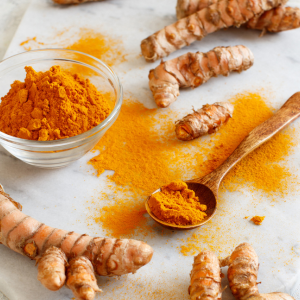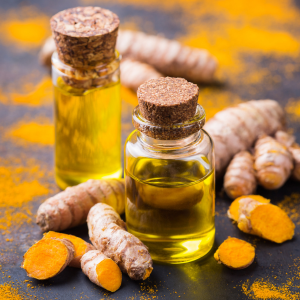Curcumin: The Powerhouse Compound from Turmeric and Its Role in Modern Health
Introduction to Curcumin
Curcumin, the active compound derived from the turmeric root (Curcuma longa), has gained widespread recognition in both traditional medicine and modern scientific research. As the vibrant yellow-orange pigment responsible for turmeric’s characteristic color, curcumin is revered for its potent anti-inflammatory, antioxidant, and immune-boosting properties. While turmeric has been a staple in Ayurvedic and Traditional Chinese Medicine for thousands of years, curcumin has recently garnered attention for its potential to combat a wide range of modern health issues, including chronic inflammation, oxidative stress, and viral infections like COVID-19.
This comprehensive guide delves into the science behind curcumin, its health benefits, and how you can effectively use it to support overall wellness. Whether you’re looking to reduce inflammation, boost immunity, or explore natural remedies for chronic conditions, curcumin stands out as a powerful herbal ally.
 Curcumin in Traditional Medicine
Curcumin in Traditional Medicine
In Ayurvedic and Traditional Chinese Medicine, turmeric has long been used as a healing spice for a variety of ailments, from digestive issues to skin conditions. The key to turmeric’s medicinal potency lies in its curcuminoids, with curcumin being the most biologically active and extensively studied. In these traditional practices, turmeric and curcumin are often prescribed to “cool” the body, clear toxins, and promote balance, especially in conditions related to inflammation and stagnation.
The Science Behind Curcumin: Active Properties
Curcumin’s impressive health benefits are attributed to its ability to modulate various biological pathways, particularly those involved in inflammation, oxidation, and cellular health. Here’s a breakdown of curcumin’s key properties:
-
Anti-Inflammatory Effects: Chronic inflammation is at the root of many modern diseases, including arthritis, heart disease, and even cancer. Curcumin works by inhibiting inflammatory pathways, such as the NF-κB pathway, and reducing the production of pro-inflammatory cytokines. This makes it an effective natural remedy for managing chronic inflammatory conditions.
-
Antioxidant Power: Curcumin is a powerful antioxidant that neutralizes free radicals and reduces oxidative stress, a key contributor to aging and disease progression. By protecting cells from damage, curcumin helps prevent the development of chronic diseases and supports overall cellular health.
-
Immune Modulation: Curcumin’s ability to modulate the immune system is especially relevant in the context of viral infections and autoimmune diseases. It enhances the body’s defense mechanisms by activating immune cells while simultaneously regulating an overactive immune response, which is critical in preventing conditions like cytokine storms seen in severe COVID-19 cases.
-
Antiviral and Antimicrobial Properties: Research has shown that curcumin has antiviral effects against a range of viruses, including the influenza virus, hepatitis viruses, and coronaviruses. By inhibiting viral replication and entry into host cells, curcumin demonstrates potential as a natural antiviral agent.
 Curcumin and COVID-19: Emerging Research
Curcumin and COVID-19: Emerging Research
Given curcumin’s anti-inflammatory, antioxidant, and immune-modulating properties, it has become a subject of interest in the management of COVID-19 symptoms and complications. While curcumin is not a cure for COVID-19, research suggests that it could play a supportive role in reducing the severity of symptoms and improving outcomes for patients.
-
Anti-Inflammatory Role in COVID-19: COVID-19 often triggers excessive inflammation, leading to complications like acute respiratory distress syndrome (ARDS). Curcumin’s ability to regulate inflammation by inhibiting pro-inflammatory cytokines could help reduce the risk of severe complications.
-
Immune Support: Curcumin may help enhance the immune response by boosting the activity of immune cells such as T-cells and natural killer cells, which are crucial in fighting off infections. At the same time, it helps prevent an overactive immune response that could lead to dangerous outcomes like cytokine storms.
-
Antiviral Potential: Preliminary studies have explored curcumin’s antiviral potential against coronaviruses. Its ability to block viral entry and replication positions curcumin as a promising adjunctive therapy in the management of COVID-19.
-
Oxidative Stress and Cellular Protection: COVID-19 can induce significant oxidative stress, leading to tissue damage and organ dysfunction. Curcumin’s potent antioxidant properties can help mitigate this damage by reducing oxidative stress and promoting cellular resilience.
Health Benefits of Curcumin: Beyond COVID-19
While curcumin’s role in managing viral infections is promising, its health benefits extend far beyond that. Here are some of the key areas where curcumin has been shown to make a difference:
-
Joint and Muscle Health: Curcumin is widely used to relieve pain and inflammation associated with arthritis, joint pain, and muscle soreness. Studies have shown that curcumin supplements can reduce symptoms of osteoarthritis and rheumatoid arthritis, making it a natural alternative to non-steroidal anti-inflammatory drugs (NSAIDs).
-
Heart Health: Curcumin’s anti-inflammatory and antioxidant effects support cardiovascular health by reducing inflammation in the arteries, lowering cholesterol levels, and preventing the oxidation of LDL cholesterol, which can lead to atherosclerosis.
-
Brain Health: Curcumin has been studied for its neuroprotective effects, particularly in relation to Alzheimer’s disease and cognitive decline. It helps reduce inflammation in the brain, enhances the clearance of amyloid plaques, and promotes overall brain health.
-
Digestive Health: Traditionally used to treat digestive disorders, curcumin supports gut health by reducing inflammation in the digestive tract, promoting healthy gut bacteria, and alleviating symptoms of conditions like irritable bowel syndrome (IBS) and inflammatory bowel disease (IBD).
 How to Use Curcumin: Forms and Dosage
How to Use Curcumin: Forms and Dosage
Curcumin is available in various forms, including capsules, tablets, powders, and extracts. However, curcumin’s bioavailability—its ability to be absorbed and used by the body—is naturally low, so it is often combined with other substances like piperine (from black pepper) to enhance absorption. Here’s how you can incorporate curcumin into your daily routine:
-
Curcumin Supplements:
- Why Use Them: Supplements are the most convenient and concentrated form of curcumin. Look for products that contain piperine or are formulated for enhanced bioavailability, such as liposomal curcumin.
- Dosage: The typical dosage of curcumin supplements ranges from 500 to 2,000 mg per day, depending on the condition being treated. For general health and prevention, 500-1,000 mg daily is sufficient. For chronic conditions, higher doses may be necessary, but it’s important to consult with a healthcare provider.
-
Turmeric Powder:
- Why Use It: Turmeric powder, which contains curcumin, can be added to food, smoothies, or taken as a tea. While it may not be as concentrated as supplements, it is a versatile way to incorporate curcumin into your diet.
- Dosage: To achieve therapeutic benefits, you would need to consume 1-3 grams of turmeric powder daily. Combining it with black pepper and a healthy fat, such as coconut oil, can enhance absorption.
-
Curcumin Extracts:
- Why Use Them: Curcumin extracts are a more potent form of curcumin and are often used in clinical studies. These extracts contain higher concentrations of curcumin and are typically combined with bioavailability enhancers.
- Dosage: Follow the manufacturer’s guidelines, but a common recommendation is 500-1,000 mg of curcumin extract daily.
Precautions and Considerations
Curcumin is generally safe for most people when taken in recommended doses, but it’s important to use it under the guidance of a healthcare provider, especially if you are pregnant, breastfeeding, or have underlying health conditions. Curcumin can interact with certain medications, including blood thinners and medications for diabetes, so always consult with your doctor before starting a curcumin supplement regimen.
Conclusion: Curcumin as a Potent Herbal Ally for Modern Health
Curcumin, the active compound from turmeric, stands as one of the most powerful natural remedies for managing inflammation, oxidative stress, and immune function. From its traditional roots in Ayurvedic and Chinese medicine to its modern application in combating chronic diseases and viral infections like COVID-19, curcumin offers a wealth of health benefits backed by science.
Whether you’re seeking relief from chronic inflammation, looking to boost your immune system, or exploring natural ways to support your body during illness, curcumin is a versatile and potent herbal ally that can play a significant role in your wellness journey. Incorporate curcumin into your daily routine through supplements, turmeric powder, or extracts to harness its full therapeutic potential.
References:
https://www.ncbi.nlm.nih.gov/pmc/articles/PMC10096702/
https://ejournal.metromedia.education/index.php/jos3/article/view/11
https://rjpponline.org/AbstractView.aspx?PID=2020-12-3-9
https://gjmpbu.org/curcumin-as-a-promising-therapy-for-covid-19-a-review/
https://www.ncbi.nlm.nih.gov/pmc/articles/PMC9877870/
https://academic.oup.com/ced/article/45/7/902/6597924

